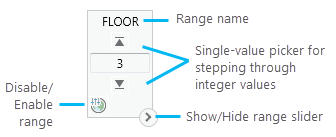Once you have defined a range for a layer or stand-alone table, the range slider appears as an on-screen control along the side of a map or scene. You can interactively adjust the minimum and maximum values of the displayed range, or move the entire range up and down. The slider and range settings are fully configurable using the Range tab, allowing you to view the full range extent of the data using logical increments. You can view the range slider either as a full extent slider or as a collapsed single-value mode. The single-value mode also supports configuring an alias for specific range values, such as displaying Ground instead of a FloorNumber value of 0, or Tuesday for a DayOfWeek value of 3.
Range slider controls
To interact with the slider and its controls, move the pointer near the space where the slider is visible at the right of the map view. When not in use, it appears transparent and some controls are hidden. Hover over it or click it to bring it into focus. Minimize the slider to simplify its appearance and give the primary focus to the map or scene. When hidden, the range properties are still applied to what is displayed on the map. The range slider opens with range disabled by default. Click the Disable range button  indicating map range is disabled on the slider to turn the range state on or off and filter data by range.
indicating map range is disabled on the slider to turn the range state on or off and filter data by range.


Tip:
The range slider automatically snaps to whole numbers if the fields driving the range are integers (whole numbers).
| Range slider item | Description |
|---|---|
Maximum thumb and Minimum thumb | The thumbs set the bounds for the currently visible range. You can type values directly onto the slider or use the Current Range group on the Range tab. You can manually drag the thumbs as well. |
Active span | The span equals the difference between the maximum and minimum thumbs for the visible range. |
Enable/Disable range | Switch between displaying data based on the range constraints set using the range slider controls and displaying all the data without any range constraints. |
Inside/Outside range | Switch between displaying data within the defined range or outside the defined range. This option is only available when the slider is shown as a full extent slider control. |
Full extent | Set the range extent of the slider to the full extent defined on the Range tab. |
Show/Hide range slider | Show or hide the range slider. Hiding the range slider does not automatically disable map range. The current range is still applied, and if the slider is playing, this continues as well. |
Play/Pause | Play a range animation that steps through ranges sequentially. Playback direction, speed, and whether to repeat or reverse can be configured from the Playback group on the Range tab. While playing, the Pause button displays in its place. |
Next/Previous step | Move forward or backward in the range by the amount defined in the step settings on the Range tab. |
Maximum extent and Minimum extent | The upper and lower values on the slider bar show the range extent of the range slider. You can modify the range extent of the slider by dragging the slider controls beyond the extent of the range slider, clicking the full range extent command, or rotating the wheel button over the range slider to zoom in and out. |
Total range extent | The colored fill in the slider bar represents the range extent as defined in the layer properties of one of more layers in the group. |
Range slider interactions
Keep the following in mind when using the range slider:
- When range is disabled on the map, you can click anywhere on the slider bar to enable range. It brings the end range slider control to the position you click.
- For improved performance during playback, allow the range slider to play through once completely. Each range step is cached so the next time you play the visualization, it pulls from the cache and, as a result, draws faster at each step.
- Use the mouse wheel button for higher precision adjustment for the slider values. The full extent must be unlocked to scroll the wheel button and interactively change range values on the slider.
- When the range is defined using two fields, the default range name is a combination of both field names, which have been concatenated and are separated by a dash.
- When using range that has values at irregular intervals, tick marks appear on the range slider indicating each range value.
Keyboard shortcuts to interact with the range slider
The playback commands for Play, Pause, Next Step, and Previous Step have keyboard shortcuts to assist in the interactive experience when viewing range data. The view must be active and the active tool must be the Explore tool to use these keyboard shortcuts.
| Keyboard shortcut | Action | Comment |
|---|---|---|
Ctrl+Shift+Spacebar | Play or pause. | Play the entire range of steps sequentially, or press the keyboard shortcut again to pause. |
Ctrl+Shift+Up arrow key | Go to next step. | Move forward in the range by the step amount defined in the step settings on the Range tab. |
Ctrl+Shift+Down arrow key | Go to previous step. | Move backward in the range by the step amount defined in the step settings on the Range tab. |
 ,
,  ,
, 
